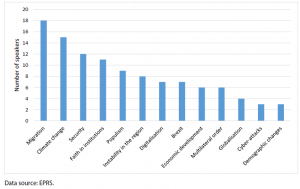The speakers recalled the numerous challenges the EU has been facing in recent times, notably the economic and financial crisis, migration and refugee crisis as well as the United Kingdom’s withdrawal from the EU (Brexit). They then outlined the main challenges of today and of the years to come (see Figure 3).
The challenges mentioned can be divided into three categories: i) policy challenges, ii) political challenges and iii) international challenges.
Regarding policy challenges, the areas mentioned most often were migration, climate change and security. These were also the three challenges most mentioned of all three categories (see above i), ii), iii). Other important policy challenges were seen in digitalisation and economic development. Concerning political challenges, the majority expressed concern at the growing distance that had developed between the institutions and the citizens, and considered that readjustments to the EU’s political and institutional performance were needed. The Belgian Prime Minister, Charles Michel, spoke of a ‘fundamental crisis of faith’ in public institutions, including European institutions, as well as in traditional media. Many linked this to the rise of populism. While many speakers saw the rise of populism as a major threat, which needs to be confronted, the Italian Prime Minister, Giuseppe Conte, saw it as an opportunity ‘to reverse a process of gradual separation between those who govern and those who are governed’. Conversely, the Prime Minister of Slovakia, Peter Pellegrini, argued that ‘the EU is not some fictitious distant Brussels. We are [the] European Union’.








Be the first to write a comment.